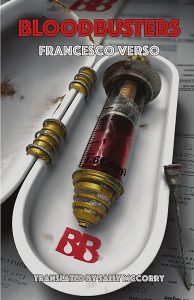BLOODBUSTERS by Francesco Verso (Book Review)
“As soon as the liquid starts flowing so does the excitement. The blood beggars lose it at the sight of available blood. The first in line move forward in the same way as the first rows in a stadium do when the rockstar comes on stage, or at the football pitch when the teams come on. In this case though, it has nothing to do with the desire to get closer to an idol, but a kind of haemomagnetism: it is the blood circulating in your veins that feels the call of more blood.”
 Francesco Verso’s BloodBusters won the Urania Award when it was released in Verso’s native Italian in 2015. Now, thanks to Sally McCorry’s translation and Luna Press Publishing, we can read it in English. A darkly satirical dystopia about a near future Italy where taxes are paid through blood withdrawals and tax evasion is a crime punished by the BloodBusters, Verso’s novel is full of cynicism, dark humour and grotesque horror. The end result is both a compelling horror/SF mash up and a meditation on systematic cruelties rendered through grotesque and colourful metaphors. Verso is an engaging and entertaining writer, and on the strength of this translation one can only hope we see more of his work translated into English.
Francesco Verso’s BloodBusters won the Urania Award when it was released in Verso’s native Italian in 2015. Now, thanks to Sally McCorry’s translation and Luna Press Publishing, we can read it in English. A darkly satirical dystopia about a near future Italy where taxes are paid through blood withdrawals and tax evasion is a crime punished by the BloodBusters, Verso’s novel is full of cynicism, dark humour and grotesque horror. The end result is both a compelling horror/SF mash up and a meditation on systematic cruelties rendered through grotesque and colourful metaphors. Verso is an engaging and entertaining writer, and on the strength of this translation one can only hope we see more of his work translated into English.
Set in a near future dystopian Rome where taxes are paid through blood withdrawals, BloodBusters follows Alan Costa, a high level BloodBuster who is charged with punishing tax evasions via forced withdrawals. What starts as a routine investigation into the accounts of Anissa Malesano, a compulsive donor who has been giving her blood to an underground organisation that distributes blood to anyone who needs it, quickly spirals out of Costa’s control. Costa careers through an increasingly disastrous series of events, involving betrayal by his colleagues and his manipulative boss, a high profile tax evasion clampdown gone horribly wrong and quantities of blood worthy of an Argento film. Against all the odds and his better judgement, Costa may even come out of all this a better person.
Bloodbusters is set in an over the top, grotesque near future dystopia Rome, which also accounts for much of its unique flavour. Verso captures both the glamour and the seediness of the Eternal City perfectly, aspects of Rome which are enlarged and caricatured for dramatic and comedic effect. A reader is unlikely to forget the image of people queuing for illicit blood from the Robin Bloods in the Villa Pamphili in the dark, or the BloodBusters swarming around the massacred corpses of patients at the Sant’Andrea hospital to collect the blood before it dries up and becomes useless. Throughout, Verso manages the impressive tightrope walk between humour and horror, never letting one overwhelm the other. The novel also features a number of inventive and memorable action set pieces. The pulpy horror aspects help to make BloodBusters stand out amongst the many fictional dystopias, its invention and humour an effective way of getting its message across rather than simply wallowing in the darkness.
Verso’s central satire is gloriously over the top, but underneath all this he is making a powerful statement about how government tax systems become embroiled in schemes to make profit at the expense of providing the vital infrastructure they are meant to support, how this leads to corruption at the highest levels, how the systems of bureaucracy around tax evasion come down brutally on the poor and disenfranchised whilst the rich and big corporations manage to evade the law without consequences. Verso’s gonzo pulp fiction dystopia allows him to tackle these serious subjects with humour, allowing the book to be fun whilst making its point. Much of the novel’s power comes from the narrative voice of Alan Costa. Alan is a fantastically unlikable character, an ex-soldier forcibly recruited into law enforcement who is cynical enough to see the problems within the system but craven and selfish enough to exploit those problems to suit his own ends. Although a victim of the system he is upholding, Verso shows how the small amount of power he has access to has gone to his head and makes him all the more enthusiastic in his wielding of that power to hurt others. The whole story is told from his point of view, and Verso gets his voice spot on. Darkly cynical and humorous, Alan is entertaining enough as a narrator to keep the reader following him even as he makes more and more unpleasant and unethical decisions. Because we have seen how bad his behaviour can be, his blatant abuse of power, his casual racism and misogyny, it makes his ultimate decision to finally commit a selfless act all the more powerful. Alan’s single act of self-sacrifice by no means redeems him, and Verso does not let him off the hook for it – Alan must suffer the full consequences of the unfair penal system he has been upholding. But ultimately the novel shows us that even the most reprehensible of us are capable of growth and change for the better, a message of hope in an otherwise darkly cynical book.
